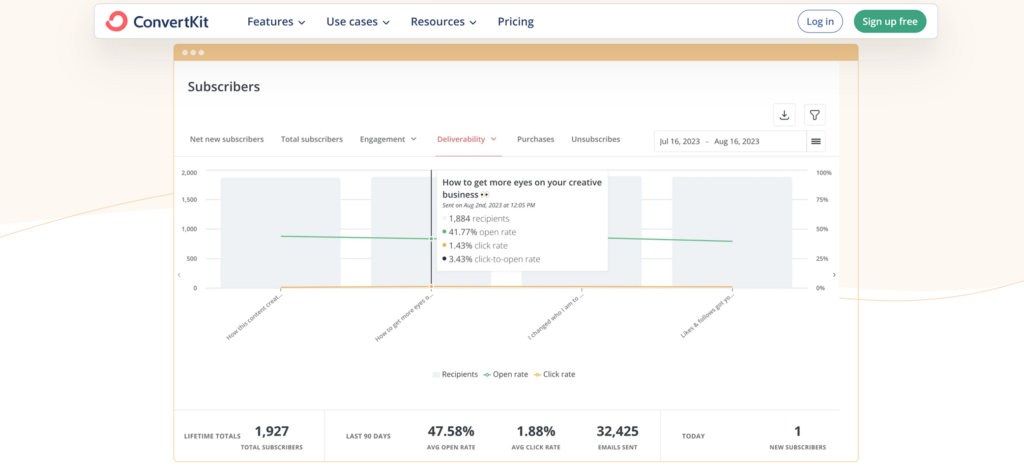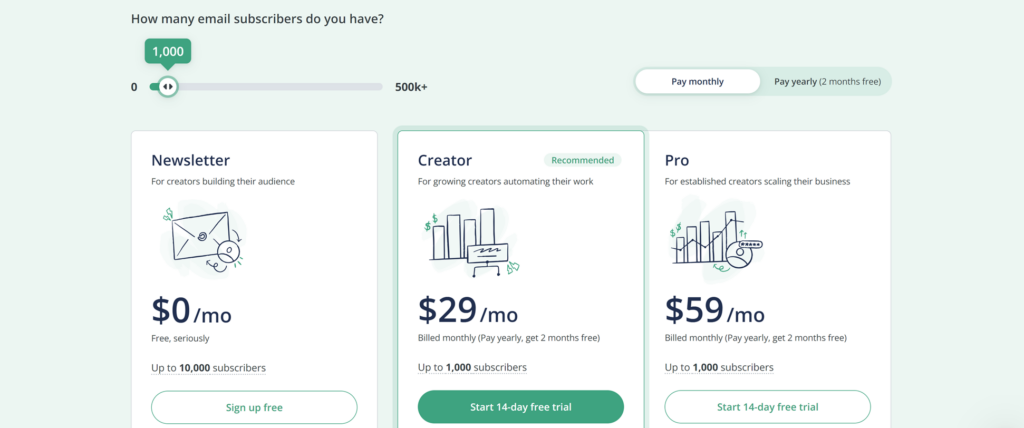- Home
- Comparing Alternatives
- Top ConvertKit Alternatives [2 ...

In today’s business landscape, companies vary in size, business type, target audience, and operational segment. So, when it comes to the choice of email marketing platform, there is no one-size-fits-all tool. The array of email marketing tools available today is extensive, offering a range of features to cater to different needs. While many platforms share common functionalities, they also have substantial differences that can impact their suitability for various types of businesses.
Whether you are a big, mature company, a four-person startup, or an individual blogger, the choice of email marketing platform should be guided by your specific requirements. By paying close attention to the unique characteristics of each platform—such as analytics, automation, and integration capabilities—you can align your business model and marketing strategy with the tools that best support your goals. This careful selection process increases the likelihood of your marketing efforts being effective and advancing your company’s objectives.
In this article, we look at ConvertKit and ConvertKit alternatives, analyzing which platform features offer the most benefits to specific business sectors.
Why Do You Need a ConvertKit Alternative?
ConvertKit is an email marketing platform that is tailored specifically for content creators such as bloggers, podcasters, YouTubers, and other digital entrepreneurs. It has been on the market since 2013 and has an overall favorable reputation among users. The platform provides a well-organized and user-friendly interface, making it perfectly suitable for solopreneurs and individual content creators. It’s a library of pre-built automation templates supported by a wide range of customizations that provides creative individuals with great tools to express their creativity.

The platform is praised for its ease of use, great customer support, and a good range of integrations. Plus, it provides users with an extra income opportunity; for example, you can monetize your newsletters. At the same time, the platform is seen as rather limited when it comes to visual design, while ConvertKit plans are not that friendly when your subscriber list starts to grow.
When it comes to a choice of an email marketing platform, ConvertKit might come as a product that fits a rather particular target audience. Nonetheless, specific industry needs also drive the search for alternatives. For example, businesses that focus heavily on ecommerce might require more advanced ecommerce features like product recommendations, cart abandonment automation, or detailed sales tracking. Similarly, B2B companies requiring robust lead scoring and account management, which are crucial for B2B marketing, would benefit more from platforms with other orientations.
Similarly, while ConvertKit might be a good choice for individual bloggers, it might be lacking in features when it comes to bigger companies. When a more complex marketing strategy needs to be fulfilled, sophisticated A/B testing, advanced segmentation, and analytics become crucial.
Finally, for small companies or individuals who are just starting their journey with marketing platforms, price often comes first. Considering that ConvertKit pricing can become quite high as the number of subscribers grows ($79 for 5000 subscribers on the Creator plan), even small businesses can look into other, more budget-friendly options.

How to Choose a ConvertKit Alternative?
When it comes to the choice of an email marketing platform, the main question that should be guiding your choice is: does this platform align with my business needs and the market segment? It is always a good idea to write down some aspects crucial for your particular business and compare several platforms against each specific feature.
Companies in the financial sector often require reliable security features, compliance with regulations like the GDPR or HIPAA, and advanced analytics to track customer engagement. This makes email services like ConvertKit not an optimal choice, as they do not offer the level of security and compliance required. On the other hand, retailers, especially those targeting millennials, might prioritize email platforms like ConvertKit that offer sophisticated automation, social media integration, and visually appealing templates. In this case, platforms like Moosend and Brevo might be the right fit because they provide these features.
Ultimately, the key to success here is to identify what your business specifically needs—be it advanced security, integration capabilities, ease of use, or affordability—and choose the email marketing platform that best meets those criteria. We made a list of features that you might use as a guide for assessing different marketing platforms:
1. Ease of use
One of the main reasons businesses choose email platforms like ConvertKit is their user-friendly interface. An easy-to-use platform minimizes the learning curve, allowing you to set up and manage your email campaigns efficiently without requiring extensive technical knowledge. Nonetheless, if you are a mature company with extensive email marketing experience, this might be a less critical factor for you. In this case, you can prefer a platform that is more complex but also offers more possibilities for your business optimization.
2. Integration capabilities
The ability to integrate with other tools and platforms is crucial. ConvertKit integrates with various third-party applications, but you might need more robust integration capabilities or just different ones. For example, for businesses operating in the financial sector, integrations with apps like FreshBooks or OneTrust might be crucial, while those operating in event management will look mostly for social media integrations.
3. Pricing
When seeking better than ConvertKit options, closely examine the pricing structures of alternatives. Some platforms offer more affordable plans or a more generous free tier, which can be advantageous for startups and small businesses. For example, the ConvertKit free trial called Newsletter allows users to run paid newsletters and subscriptions. At the same time, other ConvertKit alternatives like MailerLite provide substantial features at no cost, which can be a significant advantage for businesses just starting.
4. Features and functionality
ConvertKit is known for its email automation and segmentation capabilities, which is great. Nonetheless, if you need advanced analytics, sophisticated A/B testing, or more customizable templates, you’d better keep on looking. ConvertKit competitors like ActiveCampaign and GetResponse offer a wide range of advanced features that might better suit your marketing needs.
5. Customer support
Reliable customer support is an essential feature of any respectable email marketing platform. It is always better to look for platforms that offer multiple support channels, such as live chat, email, and phone support, along with comprehensive knowledge bases and community forums. So, such platforms as Brevo or Constant Contact can be considered among the best ConvertKit alternatives when it comes to customer support.
6. Scalability
As your business grows, your email marketing needs will evolve too. Choose a platform that can scale with your business. This includes accommodating a larger subscriber base, offering more advanced features as you need them, and providing the flexibility to adapt to changing marketing strategies.
7. Specific business needs and market segments
Different businesses have unique needs based on their industry and market segment. For instance, an ecommerce business might prioritize smooth integration with shopping platforms and advanced product recommendation features, while a B2B company might require comprehensive CRM capabilities and lead scoring. It’s important to select an email platform that aligns with your specific business requirements.
ConvertKit Alternatives for Different Businesses
Constant Contact: Constant Contact is the best ConvertKit alternative for small to medium-sized businesses and email marketing beginners. It will fit those businesses that want strong social media marketing and event management features.
Brevo: For ecommerce businesses with a moderate to large subscriber base and requiring sophisticated email marketing, Brevo is a good alternative platform. The platform offers multi-channel marketing, advanced automation, good analytics, and scalability—features usually appreciated by bigger companies.
Moosend: Moosend is the best ConvertKit alternative for budget-conscious users and startups. It provides a powerful email marketing tool with advanced automation and analytics at a lower price point. As one of the more affordable alternatives to ConvertKit, it is perfect for those looking for free email marketing options with comprehensive features.
Selzy: For small and medium-sized companies from different sectors that value innovation and efficiency in their marketing strategies, Selzy is a fitting choice. Being an equally good ConvertKit alternative when it comes to user-friendliness, Selzy also offers strong automation and segmentation features.
Instantly: Instantly is an email marketing platform that specializes in cold email campaigns and lead generation. So, in case your business is ecommerce, consulting, real estate, or any other business that benefits from cold email campaigns, Instantly will be a better choice than ConvertKit in this regard.
Summary of ConvertKit alternative platforms
| Platform | Starting price | Free plan availability | Distinctive features | Strong points | Weak points | Ideal business segment |
| ConvertKit | $29/month for up to 1,000 subscribers | Yes | Email automation, customizable forms, segmentation | User-friendly interface, excellent for content creators, robust automation | Higher pricing, limited design flexibility | Content creators (bloggers, YouTubers, podcasters) |
| Constant Contact | $30/month for up to 1,000 emails per month | No, but has a 14-day free trial | Email marketing, social media marketing, event management | Comprehensive marketing tools, strong customer support | Higher starting price, fewer advanced automation features | SMBs, nonprofits, event planners, educational institutions |
| Brevo | $9/month for 5,000 emails and 500 contacts | Yes | Email and SMS marketing, advanced automation, CRM | Affordable pricing, multi-channel marketing, strong automation | Interface can be complex for beginners | Ecommerce businesses, digital marketing agencies, SaaS |
| Moosend | $10.66/month for up to 1,000 subscribers | No, but has a free 30-day trial | Advanced automation, segmentation, A/B testing, analytics | Cost-effective, advanced features at a low price | Limited integrations compared to larger platforms | Startups, SMBs, budget-conscious users |
| Selzy | $7/month for up to 1,000 contacts | Yes | User-friendly interface, customizable templates, automation | Very affordable, easy to use, good customer support | Limited advanced features, smaller user base | Local service providers, small businesses |
| Instantly | $30/month for up to 1,000 contacts | No | Cold email campaigns, lead generation, automation, analytics | Specialized for cold emailing, strong lead generation tools | Higher pricing for niche use, less focus on other email marketing features | Businesses focused on cold emailing and lead generation |
To Sum Up
In this article, we looked at ConvertKit as one of the more specialized email marketing platforms and used it as a baseline for analysis of the best platform-business fit. By looking at each platform not from a generalized point of view but as a tool that solves specific tasks for a particular business, you can find platforms that truly improve your business and avoid disappointment altogether.
Ultimately, the right choice can boost your marketing efforts, streamline your workflows, and support your overall business goals. Evaluate your unique business needs and the distinctive features of each platform carefully and you’ll be positively surprised by results.



